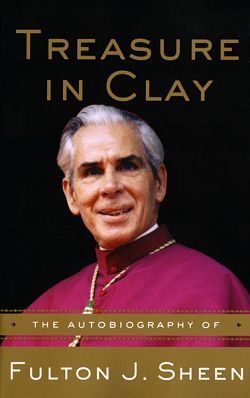Archbishop Fulton J. Sheen's autobiography includes humor and theological insights
 + Enlarge
+ Enlarge
SALT LAKE CITY — The Venerable Fulton J. Sheen has been referred to as the first televangelist. He was born Peter John Sheen, May 8, 1895, the oldest of four sons of Newton and Delia Sheen. He died Dec. 9, 1979 of heart failure. Archbishop Sheen claimed he never wanted to be anything but a priest in his autobiography, "Treasure in Clay." Still, he became more than that when his life led him to write 73 books, host two television programs and a weekly radio show and serve as editor of two magazines. Archbishop Sheen was ordained Sept. 20, 1919, and was raised to the order of Papal Chamberlain in 1934. He was named a Domestic Prelate in 1935, and was the national director of the Society of the Propagation of the Faith from 1950 to 1966. He was appointed bishop by Pope Pius XII in 1951 and served as an auxiliary bishop of the Archdiocese of New York City from then until 1966, when he was made Bishop of Rochester, N.Y. Among his many honors, Bishop Sheen’s cause for canonization for sainthood was officially opened in 2002 by Pope John Paul II. In 1952 he received an Emmy award for his television program, named after his book, "Life Is Worth Living." He was known for his theology and his sense of humor. "When the record of any human life is set down, there are three pairs of eyes who see it in a different light," Bishop Sheen writes in the first chapter of his autobiography: "1. As I see it. 2. As others see it. 3. As God sees it." A well-read man, Archbishop Sheen read biographies, Shakespeare, Carlyle, and he was particularly fond of the writings of St. Paul. He was outspoken against anti-Catholics and Communism, and referred to Hitler as an example of the "Anti-Christ." A man of peace, Archbishop Sheen called WWII not only a theological struggle, but also a "theological one." Archbishop Sheen was the first religious broadcaster in television, but his media career started in 1930 with a weekly radio show, "The Catholic Hour." Twenty years later, he had a radio audience of 4 million listeners. He began a weekly television program in 1951 that ran until 1957; afterward his nationally syndicated "The Fulton Sheen Program" ran from 1961 to 1968. In the middle of his broadcast career, in 1946, "Time" magazine referred to him as "The golden-voiced Msgr. Fulton J. Sheen, U.S. Catholicism’s famed proselytizer." Devout and caring even when he was not well and recovering from open heart surgery, his concentration was on the crucifix. "If you know Christ, it does not matter if you know nothing else; if you know nothing else, but if you know not Christ, it is as nothing to know anything else," he writes in "Treasure in Clay." "Any spirituality that I have revolves around the crucifix and the price of my redemption and the assurance of my resurrection. The pectoral cross which I carry is a crucifix. In my bedroom is a large crucifix about six feet high which, in my long confinement to bed is the panorama of salvation which I gaze on during the day and at night when waking." "Treasure in Clay" is one of the finest books written by or about Archbishop Sheen. He was known as America’s Archbishop, and received hundreds of letters every day from people of all ages. I recommend this book as well as the other books by and about Archbishop Sheen. It is good to read of a man so dedicated to God and to his vocation. "Treasure in Clay, The Autobiography of Fulton J. Sheen," © 2008 by Doubleday; originally published in 1980 by Society for Propagation of the Faith
© Copyright 2024 The Diocese of Salt Lake City. All rights reserved.

Stay Connected With Us